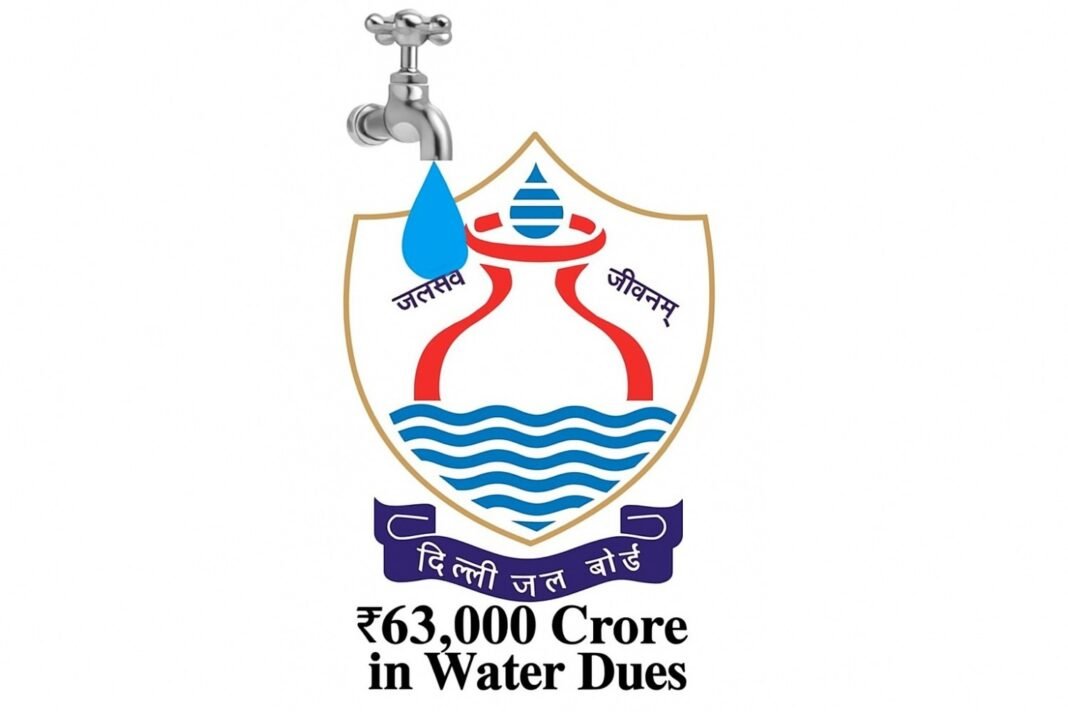New Delhi: As the Delhi Jal Board (DJB) battles a deepening financial crisis, new data reveals a staggering ₹63,019 crore in unpaid water dues from government departments — a burden split almost evenly between Delhi government bodies and central government agencies. The report, accessed by Hindustan Times, lays bare the extent of institutional non-payment, putting immense pressure on the capital’s water infrastructure and revenue system.
At the top of the defaulters list is the Municipal Corporation of Delhi (MCD), which alone owes an estimated ₹26,147 crore across 671 water connections — accounting for over 41% of the total dues. This makes MCD the single largest defaulter, significantly exacerbating DJB’s financial challenges.
From the Delhi government’s side, various departments collectively owe ₹33,295.79 crore. The Health Department is the second-largest defaulter overall, with ₹6,684 crore pending across 544 connections. Other major contributors to the dues include the Delhi State Industrial and Infrastructure Development Corporation (DSIIDC) with ₹269 crore, the Education Department with ₹31.9 crore, and the Public Works Department (PWD), which has ₹86.7 crore pending.
Central government agencies are responsible for ₹29,723.37 crore in unpaid dues. Among them, the Indian Railways emerges as the biggest offender, with a pending amount of ₹21,530 crore. The Delhi Police follows, with ₹6,097 crore in dues across 354 connections. The Delhi Development Authority (DDA) owes ₹372.8 crore, according to the DJB’s bill pendency report.
The financial distress is further compounded by DJB’s overall revenue recovery problem. In addition to government departments, commercial users owe ₹66,000 crore, and domestic consumers account for another ₹15,000 crore in arrears. A key driver of these ballooning dues is the Late Payment Surcharge (LPSC) — currently levied at a steep 18% compound interest — which has caused many old dues to spiral over time.
In response to these challenges, Water Minister Parvesh Verma acknowledged the gravity of the issue. “Water is a shared responsibility, and ensuring its uninterrupted supply requires collective effort. Resolving these financial bottlenecks will significantly strengthen our capacity to maintain and improve the city’s water infrastructure,” he said. The minister emphasized the need for cooperation from all stakeholders to ensure timely solutions that benefit Delhi residents.
Earlier this month, the Delhi government gave in-principle approval to an amnesty scheme for domestic consumers, announcing a 100% waiver on late payment surcharges for pending residential water bills. However, no decision has yet been made regarding similar relief for government or commercial users — the two largest contributors to DJB’s outstanding revenue.
Officials familiar with the matter indicate that the government is considering a shift away from the compound LPSC model, exploring a revised surcharge structure that might reduce future financial stress and avoid disproportionately inflated billing.
DJB sources also highlight persistent issues with misclassified connections, particularly those incorrectly categorized under commercial tariffs, as well as unmetered or non-functional connections, which have led to billing discrepancies and disputes. These systemic flaws have delayed payments and reconciliation efforts over the years.
To address these issues, the DJB has initiated a revenue record reconciliation process and is upgrading its billing software infrastructure. In parallel, the city is planning to scale up the deployment of smart water meters and replace outdated mechanical meters, aiming to enhance billing accuracy and reduce manual intervention.
The amnesty scheme is expected to be launched within the next two months. Meanwhile, the DJB continues to engage with various departments to seek resolution of pending dues. Despite repeated attempts, HT reported that no official responses were received from MCD, CPWD, or Delhi Police regarding their outstanding amounts.
As Delhi’s water utility strives to improve its fiscal health, the resolution of these massive institutional dues remains central to ensuring sustainable water supply and infrastructure development in the national capital.








